19 Jan2021
By Meg Kamman and Tim Neubert
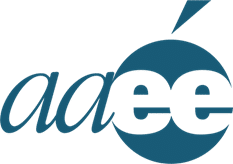 The American Association for Employment in Education (AAEE) is requesting AACTE members’ participation in the 2020-2021 Educator Supply and Demand Survey, conducted in conjunction with the Center for Marketing & Opinion Research, LLC (CMOR). Both AAEE members and non-members are invited and encouraged to participate.
The American Association for Employment in Education (AAEE) is requesting AACTE members’ participation in the 2020-2021 Educator Supply and Demand Survey, conducted in conjunction with the Center for Marketing & Opinion Research, LLC (CMOR). Both AAEE members and non-members are invited and encouraged to participate.
With data and perceptions gathered from colleges, universities, and school systems over several decades, the report generated will provide you and your institution with valuable regional and national insights and trends in PK-12 educator supply and demand. An electronic version of this report will be provided to all respondents in Spring 2021 at no cost.
Completion of the survey should take about 15 minutes and all responses will remain confidential.
Preview questions (in PDF format) prior to survey completion.
College or University? Complete this survey.
School District? Complete this survey.
07 Jan2021
By JTE Insider
Check out a recent JTE Insider podcast by the Journal of Teacher Education (JTE) editorial team. This blog is available to the public, and AACTE members have free access to the articles in the JTE online archives—just log in with your AACTE profile.
This podcast interview features insights from the article, “Contrast, Commonality, and a Call for Clarity: A Review of the Use of Core Practices in Teacher Education,” by Dana Grosser-Clarkson and Michael A. Neel. The article was published in the September/October 2020 issue of the Journal of Teacher Education.
Article Abstract: In recent years, substantial resources have been invested in researching and describing the enactment of “core practices” of teaching in teacher education. This review of the literature examined more than 40 articles published between 2008 and August 2018 in an effort to determine how teacher educators are supporting teacher candidates to learn about and enact core practices of teaching. The review of the literature presented here demonstrates two distinct approaches that teacher educators use to introduce and prepare teacher candidates to enact core practices: a predesigned enactment approach and an open-design enactment approach. Our goal in identifying these two approaches is to illuminate the role and actions of teacher educators in core-practice work and to demonstrate that the decisions teacher educators make in core-practice work are complex and nuanced, and require further description than heretofore available.
05 Jan2021
By JTE Insider
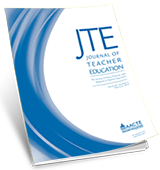 Check out a recent JTE Insider podcast by the Journal of Teacher Education (JTE) editorial team. This blog is available to the public, and AACTE members have free access to the articles in the JTE online archives—just log in with your AACTE profile.
Check out a recent JTE Insider podcast by the Journal of Teacher Education (JTE) editorial team. This blog is available to the public, and AACTE members have free access to the articles in the JTE online archives—just log in with your AACTE profile.
This podcast interview features insights from the article “Creativity Promotion in an Excellence Program for Preservice Teacher Candidates” by Yael Kimhi and Leiky Geronik. The article was published in the November/December issue of the Journal of Teacher Education.
30 Nov2020
By Erica D. McCray
This article originally appeared in District Administration and is reprinted with permission.
 The teacher shortage is real, complex, and concerning—especially in high-demand specialty areas such as special education, math and science, English as a second language, and foreign language. This comes as no surprise, as many reports indicate low enrollment in these educator preparation program (EPP) teaching areas. While it is important to reflect upon the current state of the teacher shortage, it is imperative that EPPs analyze changes in student enrollment to determine future implications for the teacher workforce.
The teacher shortage is real, complex, and concerning—especially in high-demand specialty areas such as special education, math and science, English as a second language, and foreign language. This comes as no surprise, as many reports indicate low enrollment in these educator preparation program (EPP) teaching areas. While it is important to reflect upon the current state of the teacher shortage, it is imperative that EPPs analyze changes in student enrollment to determine future implications for the teacher workforce.
The American Association of Colleges for Teacher Education (AACTE) recently released the issue brief, Degree Trends in High-Demand Teaching Specialties. Authored by Jacqueline E. King, Ph.D., the report examines trends in sub-specialties within the high-demand areas based on data that colleges report to the U.S. Department of Education’s Integrated Postsecondary Education Data System (IPEDS). While the report offers a few bright spots, it suggests that current PK-12 school shortages will not be remedied simply by hiring newly-prepared teachers.
10 Nov2020
By JTE
This Journal of Teacher Education (JTE) interview features insights on the article entitled, “What Constitutes an ‘Opportunity to Learn’ in Teacher Preparation?” by Julie Cohen and Rebekah Berlin. The article was published in the September/October 2020 issue of the JTE. AACTE members have free access to the articles in the JTE online archives—just log in with your AACTE profile.
What motivated you to pursue this particular research topic?
The goal of the paper was to surface issues around measuring what happens in teacher preparation, in particular, the construct of “opportunity to learn” or OTL. Much of the prior research on OTL has relied on survey data, and scholars have often treated the idea of OTL as an objective reality, contingent on features of coursework or fieldwork made available in a given program. However, self-reports of “opportunities” are often divergent from other measures—like observations—of the same events. Rather than assume that self-reports tell us something conclusive about a particular program, we wanted to use the rich, multifaceted data we had from a longitudinal study of teacher preparation to analyze whether program features and candidate characteristics explain variation in reported OTL.
23 Oct2020
By JTE
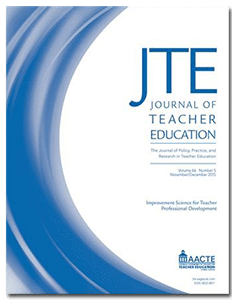 Check out a recent JTE Insider blog interview by the Journal of Teacher Education (JTE) editorial team. This blog is available to the public, and AACTE members have free access to the articles in the JTE online archives—just log in with your AACTE profile.
Check out a recent JTE Insider blog interview by the Journal of Teacher Education (JTE) editorial team. This blog is available to the public, and AACTE members have free access to the articles in the JTE online archives—just log in with your AACTE profile.
This interview features insights on the article entitled, “Rethinking High-Leverage Practices in Justice-Oriented Ways” by Angela Calabrese Barton, Edna Tan, and Daniel J. Birmingham. The article was published in the September/October 2020 issue of the Journal of Teacher Education.
Article Abstract: Justice-oriented teaching must address how classroom-based disciplinary learning is shaped by interactions among local practice and systems of privilege and oppression. Our work advances current scholarship on high-leverage practices [HLPs] by emphasizing the need for teaching practices that restructure power relations in classrooms and their intersections with historicized injustice in local practice as a part of disciplinary learning. Drawing upon a critical justice stance, and long-term collaborative work with middle school teachers and youth, we report on empirically driven insights into patterns-in-practice in teaching which yield insight into both what justice-oriented high-leverage practices may be, and the cross-cutting ideals which undergird them. We discuss the patterns-in-practice and their implications for teaching and learning across subject areas: HLPs that work toward equitable and consequential ends need to be understood in terms of the practice itself and its individual and collective impact on classroom life.
23 Oct2020
By Jacqueline E. King, Ph.D.
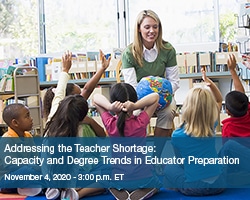 Before the coronavirus pandemic, there were significant teacher shortages in many communities. Since the pandemic began, teacher retirements and other departures from the profession have accelerated. Can the nation’s higher education institutions meet the demand for new teachers, particularly in high-demand fields such as special education, STEM, and foreign language? What do trends over the last decade portend for the future of educator preparation?
Before the coronavirus pandemic, there were significant teacher shortages in many communities. Since the pandemic began, teacher retirements and other departures from the profession have accelerated. Can the nation’s higher education institutions meet the demand for new teachers, particularly in high-demand fields such as special education, STEM, and foreign language? What do trends over the last decade portend for the future of educator preparation?
An upcoming webinar will review the findings from two new AACTE issue briefs that address these questions:
- Institutions Offering Degrees in Education: 2009-10 to 2018-19
- Degree Trends in High-Demand Teaching Specialties: 2009-10 to 2018-19
22 Oct2020
By AACTE
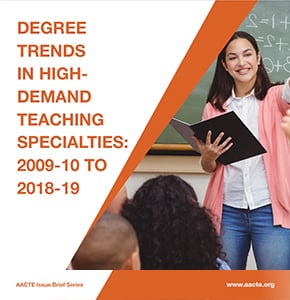
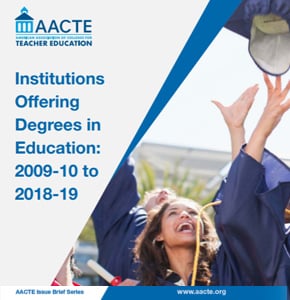
The American Association of Colleges for Teacher Education (AACTE) released today two new issue briefs, Institutions Offering Degrees in Education: 2009-10 to 2018-19 and Degree Trends in High-Demand Teaching Specialties: 2009-10 to 2018-19. The reports examine education trends through an analysis of the number of institutions awarding degrees in education and the imminent threat of increased teacher shortages , particularly in high-demand areas. The findings raise significant concerns about the nation’s future capacity to produce new teachers and other education professionals to meet the diverse needs of students, families, and communities.
The Institutions Offering Degrees in Education report describes the number of institutions awarding degrees in education from 2009-10 to 2018-19, and offers a table listing of institutions awarding any degree in education by state and institution type during this period. It reveals that, while the number of institutions offering degrees in education has been stable, the number of institutions with small programs, defined as awarding 30 or fewer degrees and certificates annually, rose by 21%. These institutions currently make up one-third of all colleges and universities awarding education degrees. Of critical importance is that the average number of education graduates across all institution types fell by 24% from 2009-10 to 2018-19.
07 Oct2020
By Weade James
AACTE recently published an article in the Success in High Need Schools Journal to amplify promising practices for recruiting and retaining teacher candidates. In this article, titled “The Use of Networked Improvement Communities in Educator Preparation Programs to Improve Teacher Shortage and Diversity”, Jacqueline Rodriguez , AACTE vice president, research, policy, & advocacy, and I highlight the contributing factors to the teacher shortage and diversity crises in our nation.
These factors include but are not limited to the declining enrollment and degrees awarded in education, financial barriers to pursuing a teaching credential, and the lack of culturally-relevant strategies to attract and retain diverse candidates. Research show that these factors are more prevalent for minorities, thus contributing to the dismal representation of minority teachers in the profession compared to their White counterparts (80%).
18 Sep2020
Revolutionizing Education
By Christine Gentry and Lorraine Zhong
Christine Gentry
The culminating course of the NYU Teacher Residency focuses on a year-long participatory action research (PAR) journey residents take with a small group of students. PAR is a collaborative, iterative process of inquiry and action in response to an organizational or community problem. Residents and their students work as a team to identify a problem of practice, research that problem of practice, craft action and data collection plans, implement those plans, and then evaluate their impact through analysis of gathered data. In presentations at the end of the course, residents reflect on the entire process and how it helped develop student agency, advocacy, and voice as well as their own leadership. It is the faculty’s hope that during the PAR journey, residents practice radical listening and how to be mindful learners and leaders.
In March 2020, COVID-19 entered the residents’ PAR experience like a wrecking ball. I gathered with the other PAR instructors to decide how we were going to adjust the project for our residents, considering the radical change in access both to physical spaces and to the students in the PAR teams. We ultimately decided to offer the residents two choices: a reflective path, in which they could craft a presentation on their team’s original plan and the progress they were able to make pre-COVID, and a virtual pilot path, in which they could adjust their projects to the virtual space we all suddenly found ourselves in. Understandably, most residents chose to pursue the reflective path, but one resident, Lorraine Zhong, and her team of students chose to continue their project virtually. Her project is a model for how the PAR instructors in the NYU Teacher Residency will be approaching the project this year, with COVID-19’s grip still firmly on our schools. Her journey is a beautiful example of the transformative power of PAR—its ability to strengthen relationships, build student investment, and spark meaningful change—even in the face of this new and terribly difficult time for our schools.
I’ll let her take it from here.
14 Sep2020
By Shelley B. Wepner and William Henk

The professional literature on the lifespan of education deans in their positions indicates that they serve in the role four to six years on average. We discovered a similar finding when we conducted a study through AACTE about education deans’ perceptions of essential characteristics for contributing to their success. More than two-thirds had been in their current position for five years or less (Wepner et al., in press). By the same token, though, we found that one-third of the education deans stayed in their positions much longer. These findings piqued our interest in the construct of longevity in the education deanship and inspired us to conduct a qualitative study, with the assistance of AACTE, of the factors contributing to the length of time education deans remain in office.
We believed that the construct deserved study because endurance in this demanding administrative capacity would presumably exert an impact on the welfare of schools and colleges of education. In a related vein, resilience as an education dean would seem to signify a reasonable indicator of sustained effectiveness, while brevity in the job might suggest the reverse. We also pursued the construct with the understanding that the roles and responsibilities of education deans, while resembling other academic deans, do present some markedly unique challenges that might affect longevity, and that there would be value for those in positions to affect education deans’ tenures positively, whether central administrators, peers, faculty or staff, to better understand the factors that promote longevity.
08 Sep2020
By Jacqueline E. King, Ph.D.
After a highly successful tenure, it is time for Michigan State University to hand over the reins of AACTE’s premier publication to a new campus-based team. The Journal of Teacher Education (JTE) is a 120-page refereed scholarly publication on teacher education policy, practice, and research. It is published five times each year; the editors typically receive more than 800 articles annually, of which about 40 are published.
The JTE editor is responsible for editorial administration of the journal. This includes receiving and screening manuscripts; coordinating the blind peer-review process; substantive editing; working with authors on revisions; selecting and organizing final articles for each issue; writing an editorial; and transmitting print-ready issue copy to SAGE Publications, Inc., which provides copy editing, layout, and printing services for the journal and manages its subscription, distribution, and marketing activities.
Proposals to serve as the editorial team for JTE are due on October 1 (see this blog post for more information and a link to the RFP).
If you plan to submit a proposal, what should you be considering? A successful proposal will provide comprehensive answers to the following key questions:
27 Aug2020
By Whitelaw Reid
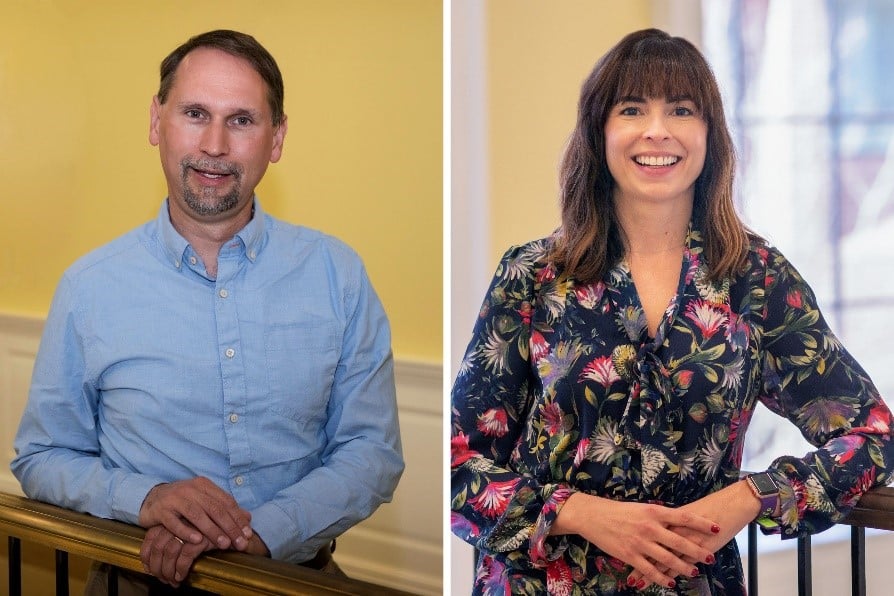 This article originally appeared in the University of Virginia’s UVAToday online news magazine and is reprinted with permission.
This article originally appeared in the University of Virginia’s UVAToday online news magazine and is reprinted with permission.
Two University of Virginia professors who played a significant role in this week’s Flint, Michigan, water crisis lawsuit settlement are being applauded around the country.
Gail Lovette and Bill Therrien, professors in UVA’s Curry School of Education and Human Development, worked pro bono on the case for nearly four years, analyzing how increased exposure to lead in Flint’s municipal water supply affected children’s learning.
On Thursday, they saw their work pay off in the form of a $600 million settlement with the State of Michigan and other defendants that includes at least $9 million in new funding for special education programs in Flint Community Schools and surrounding school districts that educate special education students who were on the Flint water lines.
Lovette and Therrien called the result a “testament to the people of Flint.”
“Parents and teachers—some at potential great risk because they were still employed by the schools—stood up for their community’s children and students,” Therrien said.
The two professors were part of the litigation efforts of the ACLU of Michigan, the Education Law Center and the New York-based global law firm White and Case. They spent time in Flint, speaking with educators and families and reviewing documents associated with the schools and districts.
17 Aug2020
By Brian McNeill
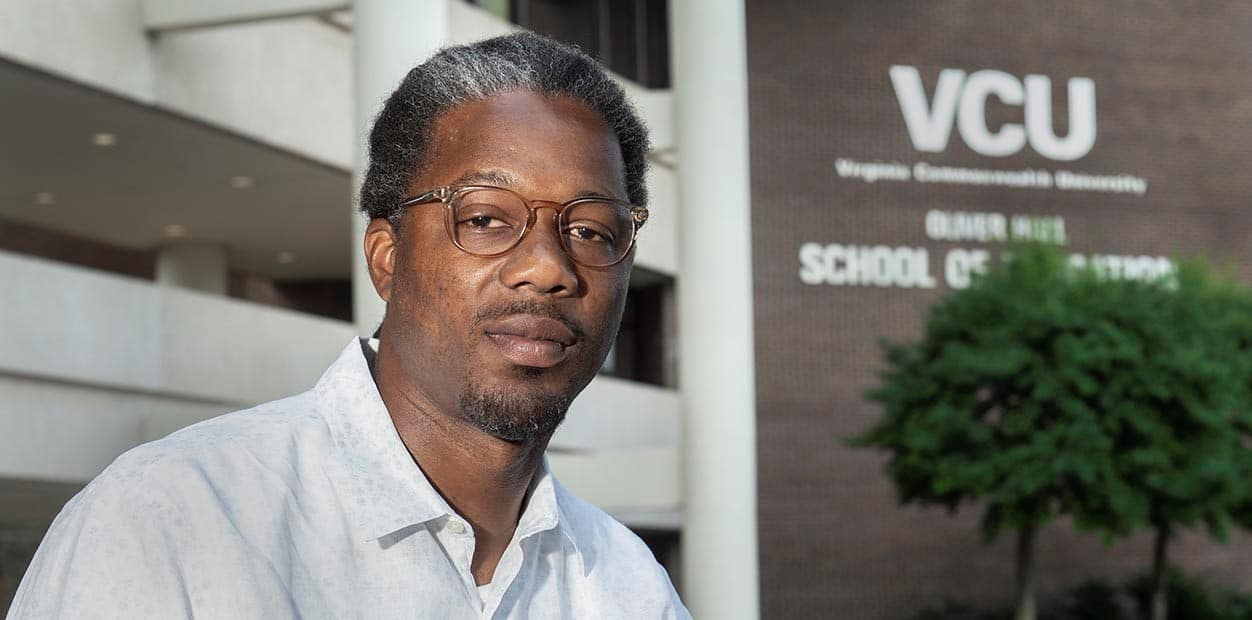
This article originally appeared on the Virginia Commonwealth School of Education website and is reprinted with permission.
As public school systems across the country are readying plans to reopen — in some fashion — this fall, a new study at Virginia Commonwealth University (VCU) is investigating the preparedness of two school districts within the greater Richmond area amid the COVID-19 pandemic.
The study, “Exploring PreK-12 Public School Systems’ Pandemic Preparedness During COVID-19 School Closures,” is led by Holmes Scholar alumnus Dwayne Ray Cormier, Ph.D., an assistant professor in the Department of Foundations of Education in the School of Education and a visiting iCubed scholar.
“I wanted to see: what do the protocols and processes look like?” Cormier said. “And I then want to see if there’s anything we can learn that can be shared throughout the state or throughout the country that would help schools prepare.”
17 Aug2020
By Jacqueline Rodriguez

Inclusive leadership is better for schools, teachers, and all students. Every student deserves to attend a school led by a principal with the skills, knowledge, and training to promote equity for all students, including students with disabilities. Yet, general education teachers and school principals report being underprepared to effectively serve students with disabilities. Only 12 percent of a nationally representative sample of school principals and only 17 percent of general education teachers report feeling well prepared to serve and teach students with disabilities.
Support for Preparing Inclusive School Leaders During COVID-19
While the COVID-19 crisis has disrupted education for all students, students with disabilities face unique challenges in transitioning to remote learning and in their eventual transition back to the classroom. Like the pandemic and the systemic racism plaguing our nation, inequitable access to effective school leadership is more prevalent for underserved populations, including students with disabilities. A recently released brief from CCSSO, the CEEDAR Center, and the Center on Great Teachers and Leaders highlights key recommendations, examples, and resources to support educator preparation programs (EPPs) and Deans of Education in addressing the pressing challenges for school leaders posed by the COVID-19 crises.
 The American Association for Employment in Education (AAEE) is requesting AACTE members’ participation in the 2020-2021 Educator Supply and Demand Survey, conducted in conjunction with the Center for Marketing & Opinion Research, LLC (CMOR). Both AAEE members and non-members are invited and encouraged to participate.
The American Association for Employment in Education (AAEE) is requesting AACTE members’ participation in the 2020-2021 Educator Supply and Demand Survey, conducted in conjunction with the Center for Marketing & Opinion Research, LLC (CMOR). Both AAEE members and non-members are invited and encouraged to participate.






 Check out a recent JTE Insider podcast by the Journal of Teacher Education (JTE) editorial team. This blog is available to the public, and AACTE members have free access to the articles in the JTE online archives—just
Check out a recent JTE Insider podcast by the Journal of Teacher Education (JTE) editorial team. This blog is available to the public, and AACTE members have free access to the articles in the JTE online archives—just  The teacher shortage is real, complex, and concerning—especially in high-demand specialty areas such as special education, math and science, English as a second language, and foreign language. This comes as no surprise, as many reports indicate low enrollment in these educator preparation program (EPP) teaching areas. While it is important to reflect upon the current state of the teacher shortage, it is imperative that EPPs analyze changes in student enrollment to determine future implications for the teacher workforce.
The teacher shortage is real, complex, and concerning—especially in high-demand specialty areas such as special education, math and science, English as a second language, and foreign language. This comes as no surprise, as many reports indicate low enrollment in these educator preparation program (EPP) teaching areas. While it is important to reflect upon the current state of the teacher shortage, it is imperative that EPPs analyze changes in student enrollment to determine future implications for the teacher workforce. Check out a recent
Check out a recent  Before the coronavirus pandemic, there were significant teacher shortages in many communities. Since the pandemic began, teacher retirements and other departures from the profession have accelerated. Can the nation’s higher education institutions meet the demand for new teachers, particularly in high-demand fields such as special education, STEM, and foreign language? What do trends over the last decade portend for the future of educator preparation?
Before the coronavirus pandemic, there were significant teacher shortages in many communities. Since the pandemic began, teacher retirements and other departures from the profession have accelerated. Can the nation’s higher education institutions meet the demand for new teachers, particularly in high-demand fields such as special education, STEM, and foreign language? What do trends over the last decade portend for the future of educator preparation? 


 This article originally appeared in the University of Virginia’s
This article originally appeared in the University of Virginia’s 
